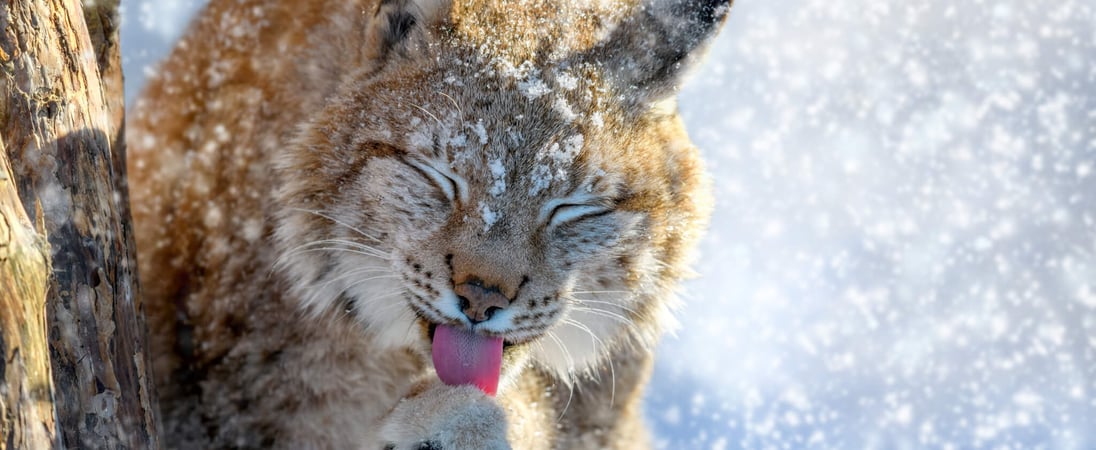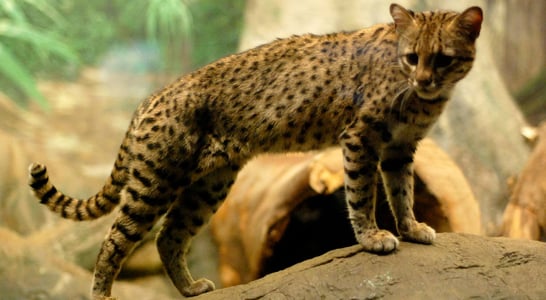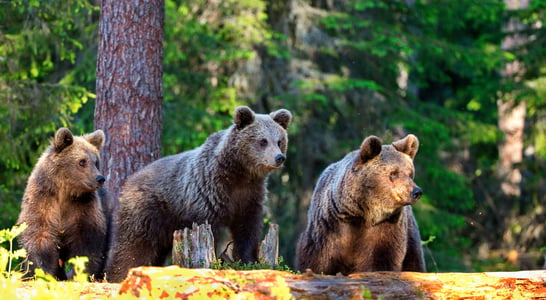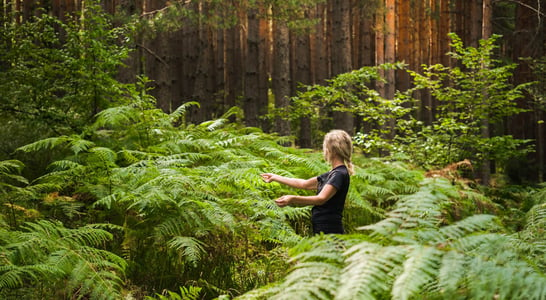
International Lynx Day
These wild felines, known for tufted ears and stealthy ways, roam their habitats with a cool confidence that's totally captivating.
A medium-sized feline that prefers a forest home, the lynx is a nocturnal, solitary cat that enjoys hunting rabbits as well as other rodents or sometimes small deer. These elusive cats have a lifespan of around 17 years in the wild and about 20 years in captivity, and their coat color can vary based on the climate they live in.
The Eurasian lynx resides in the central and eastern regions of Europe, while the Iberian lynx can be found in southwest Spain, and both are considered in danger of extinction. In North America, some feline cousins are the Canadian lynx and the bobcat, but their populations are considered stable and not at risk.
International Lynx Day is here to feature these cats and raise awareness about their potentially irreversible plight!
History of International Lynx Day
Through hunting, loss of habitat, and low populations of prey (particularly wild rabbits), the lynx has found it very difficult to survive over the past 150 years.
Since the 1970s, conservation projects began to identify the shrinking size of the lynx populations and the Eurasian lynx was the first subtype to be reintroduced and protected. Several years later, the Iberian lynx was also identified as at risk and made its way onto endangered lists for protection.
Today, though the populations of the lynx do seem to be growing, they are still in need of help. Efforts toward conservation of these animals mean providing them adequate places to live and hunt, without the threat of unnatural causes of death. Currently the number of Euraisian lynx is estimated to be around 9000 while the Iberian lynx is still only around 400, making it the most endangered wildcat in the world.
International Lynx Day got its start in 2017 when it was first established as a collaborative effort initiated by the transboundary 3Lynx Project. Since then, the day has been observed each year to raise awareness for the very real threat that is posed against this majestic cat.
International Lynx Day seeks to increase knowledge and education surrounding the plight of these felines, while raising funds and efforts to protect them as their populations are given the time and opportunity to increase. This is a day to consider a variety of ways to support this amazing cause, bringing restoration back to nature through the protection and care of these beautiful creatures in their natural habitat.
International Lynx Day Timeline
1850
Lynx is on the brink of extinction in Europe
Because of hunting and the loss of habitat, the survival of the species is threatened in the mid 19th century. [1]
1970s
Lynx are reintroduced in Europe
Reintroduction programs release lynx into the wild with the hopes of repopulation. [2]
2002
Iberian lynx population reaches all time low
With fewer than 100 Iberian lynx in the wild, the threat of extinction is massive. [3]
2014
Endangered Iberian lynx is added to IUCN Red list
Conservation measures for this subtype of lynx include releasing captive bred cats, maintaining the wild rabbit population for food and reducing unnatural causes of death. [4]
2020
Lynx population continues to grow
While still endangered, the Eurasian lynx population grows to estimates of 50,000 worldwide.[5]
How to Celebrate International Lynx Day
In honor of International Lynx Day, show some appreciation and support for this endangered species of feline that is so fascinating and mysterious. Get started celebrating the day with some of these fun ideas:
Learn Interesting Facts About the Lynx
In a nod to the animal who is honored on this day, perhaps it would be fun to take some time to read about and remember some fun facts about the lynx. Not only is it a great way to respect this animal, but it’s an easy way to raise awareness by bringing it up in conversation with friends, family or coworkers.
Show some love on International Lynx Day by learning and sharing some of these facts:
-
The name of the lynx comes from a word with Greek roots that means “to shine”. This is presumably because of the way this feline’s eyes seem to glow.
-
The amazing hearing and eyesight of the lynx makes them brilliant hunters with quick reflexes. They can spot a mouse from 250 meters away!
-
A baby lynx needs its mother to survive, particularly through its first winter. Their eyes stay closed for two weeks, they can’t go out at all for their first five weeks of life and they only wean after two months.
-
Lynxes can be hard to repopulate because breeding can only happen for about a month, from February to March.
Host an International Lynx Day Gathering
From a party at home with a few friends to a kids educational assembly time at school, International Lynx Day is a great time to get creative with getting the people together in support of this endangered cat. Decorate with items and pictures along the theme of these cats, play songs from a playlist with a lynx theme, and even invite guests to wear their favorite cat ears or costume! For entertainment and education, it might be fun to view a documentary about lynxes.
For those interested in raising funds to support the lynx, this would be a perfect time to take donations that can be passed on to a charity that supports these animals.
Make a Donation to Support Lynx Conservation
Put some financial support behind International Lynx Day by raising funds or making a personal donation to the cause. A number of different charities are helping in the effort to protect and repopulate lynxes throughout Europe and central Asia. Take a look at some of these:
- EuroNatur. This organization makes transboundary nature conservation work, with a specific program that helps with sponsoring lynxes.
- World Wildlife Federation. This highly trusted charity is working hard to build a world where people and nature can thrive together, specifically including lynxes.
- The Big Cat Sanctuary. This UK charity located in Kent offers a place dedicated to wild cat conservation. With breeding programs, education and more, this organization is working to save the world’s most iconic and endangered species.
Watch a Lynx Documentary
Because of their elusive and solitary behaviors, lynx are fascinating creatures that can be difficult for humans to observe. Even so, several documentaries have been made that have brought some of the mystery to light.
International Lynx Day is an ideal time to get more educated and knowledgeable by viewing one of these documentaries or shows about the lynx. Grab a few friends, family members, kids or coworkers to learn a bit more about this incredible cat with some of these:
- BBC Earth Wild Stories: The Elusive Iberian Lynx (2021).
- Go Wild: Leap of the Lynx (2023).
- BBC Earth Seven Worlds, One Planet: Reintroducing Europe’s Wildest Cat (2019)
- Save the Lynx Documentary (2020)
International Lynx Day FAQs
Are lynx dangerous?
While lynx cats are certainly carnivorous predators, they are not considered a threat to humans – though they would defend themselves if attacked. [1]
Where does a lynx live?
Lynx are felines that live hidden in the forests either in Europe/Asia or North America. [2]
Are bobcats and lynx the same?
The bobcat is a subtype that is the smallest of the Lynx genus.[3]
What do lynx eat?
Lynx are feline carnivores that dine on wild rabbits as well as other rodents and sometimes small deer. [4]
How big is a lynx?
The lynx is a medium-sized feline that ranges from 32-47 inches in length and can weigh from a range of 18-65 pounds. [5]
Also on ...
View all holidaysInternational Yarn Bombing Day
Join a world of other creative knitters and crochet-ers by “yarn bombing”, or covering your town or area with your beautiful, colorful, fun yarn creations.
National Corn on the Cob Day
Nothing says summer quite like a perfectly grilled (or boiled) corn on the cob, doused with butter, salt, pepper, or perhaps a more creative seasoning profile.
National German Chocolate Cake Day
Try your hand at making a rich and delicate German chocolate cake, or go the lazy way and search your town for the finest pre-made version of the same.
We think you may also like...
World Geoffroy’s Cat Day
These felines, small and elusive, roam the South American wilderness, displaying remarkable adaptability in their natural habitat.
World Nature Conservation Day
Caring for the planet's beauty and creatures is like giving the Earth a big, loving hug. Join the effort and make a positive impact!








